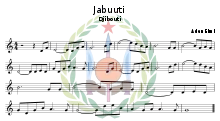Djibouti (anthem)
Djibouti (Somali: Jabuuti, Afar: Gabuuti, Arabic: جيبوتي Jibuti ) is the national anthem of Djibouti.[1]
 | |
National anthem of | |
| Lyrics | Aden Elmi (b. 1950), 1977 |
|---|---|
| Music | Abdi Robleh (b. 1945), 1977 |
| Adopted | 1977 |
| Audio sample | |
"Djibouti" (instrumental)
| |
History
The Djibouti national anthem was adopted upon independence from France in 1977. The words are in Somali, and were written by Aden Elmi. The melody was composed by Abdi Robleh.[1]
The anthem was first officially played at an independence ceremony on June 27, 1977.[2]
Historical references
Thematically, Elmi's lyrics reference the country's flag as it relates to Djibouti's struggle for independence. The French had staked claim to the region known as French Somaliland in the mid-1800s. For the next century, the region was overseen by a series of French governors. The area served as a backdrop for French battles with various opponents including Russia and Italy.
In 1958, a referendum was held in Djibouti to decide whether or not to join the Somali Republic or to remain with France. The referendum turned out in favour of a continued association with France,[3] but there were reports of vote rigging, with the French expelling thousands of Somalis before the referendum reached the polls.[4] In August 1960, an official visit to the territory by then French President, General Charles de Gaulle, was also met with demonstrations and rioting.[5][6]
On 19 March 1967, a second plebiscite was held. Similar to the 1959 referendum, voting was also divided along ethnic lines, with the resident Somalis generally voting for independence, with the goal of eventual reunion with Somalia, and the Afars largely opting to remain associated with France.[5] There were again reports of vote rigging on the part of the French authorities.[7] Announcement of the results sparked civil unrest, including several deaths. France also increased its military force along the frontier.[8][9] Soon after, the territory was renamed French Territory of the Afars and Issas, but a growing Somali and Afar population united led to a vote for independence in 1977, officially marking Djibouti's independence.[6][10]
Music
The melody by Abdi Robleh is written in common 4/4 time. It consists of twenty measures.[11]
Anthem
| Somali lyrics | Afar lyrics | English translation | French translation | Arabic translation | |
|---|---|---|---|---|---|
Hinjinne u sara kaca |
Soolisnuh inkih solaa |
Arise with strength! For we have raised our flag, |
Lève-toi avec force! Parce que nous avons hissé notre drapeau, |
تنشأ مع قوة! لقد أثرنا لعلمنا، | |
See also
References
- "Africa: Djibouti". CIA. October 7, 2016. Retrieved October 14, 2016.
- "NCNA Reports on Djibouti Independence Ceremony". Djibouti: U.S. Foreign Broadcast Information Service. 27 June 1977.
- Barrington, Lowell, After Independence: Making and Protecting the Nation in Postcolonial and Postcommunist States, (University of Michigan Press: 2006), p. 115 ISBN 0472068989
- Kevin Shillington, Encyclopedia of African history, (CRC Press: 2005), p. 360 ISBN 1579582451.
- A Political Chronology of Africa, (Taylor & Francis), p. 132.
- Newsweek, Volume 81, (Newsweek: 1973), p. 254.
- American Universities Field Staff, Northeast Africa series, Volume 15, Issue 1, (American Universities Field Staff.: 1968), p. 3.
- Jean Strouse, Newsweek, Volume 69, Issues 10-17, (Newsweek: 1967), p. 48.
- Alvin J. Cottrell, Robert Michael Burrell, Georgetown University. Center for Strategic and International Studies, The Indian Ocean: its political, economic, and military importance, (Praeger: 1972), p. 166.
- Elections in Djibouti African Elections Database
- Robleh, Abdi; Elmi, Aden. "Anthem of the Republic of Djibouti".